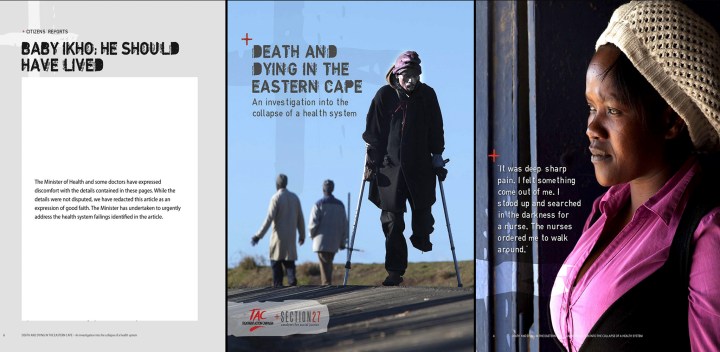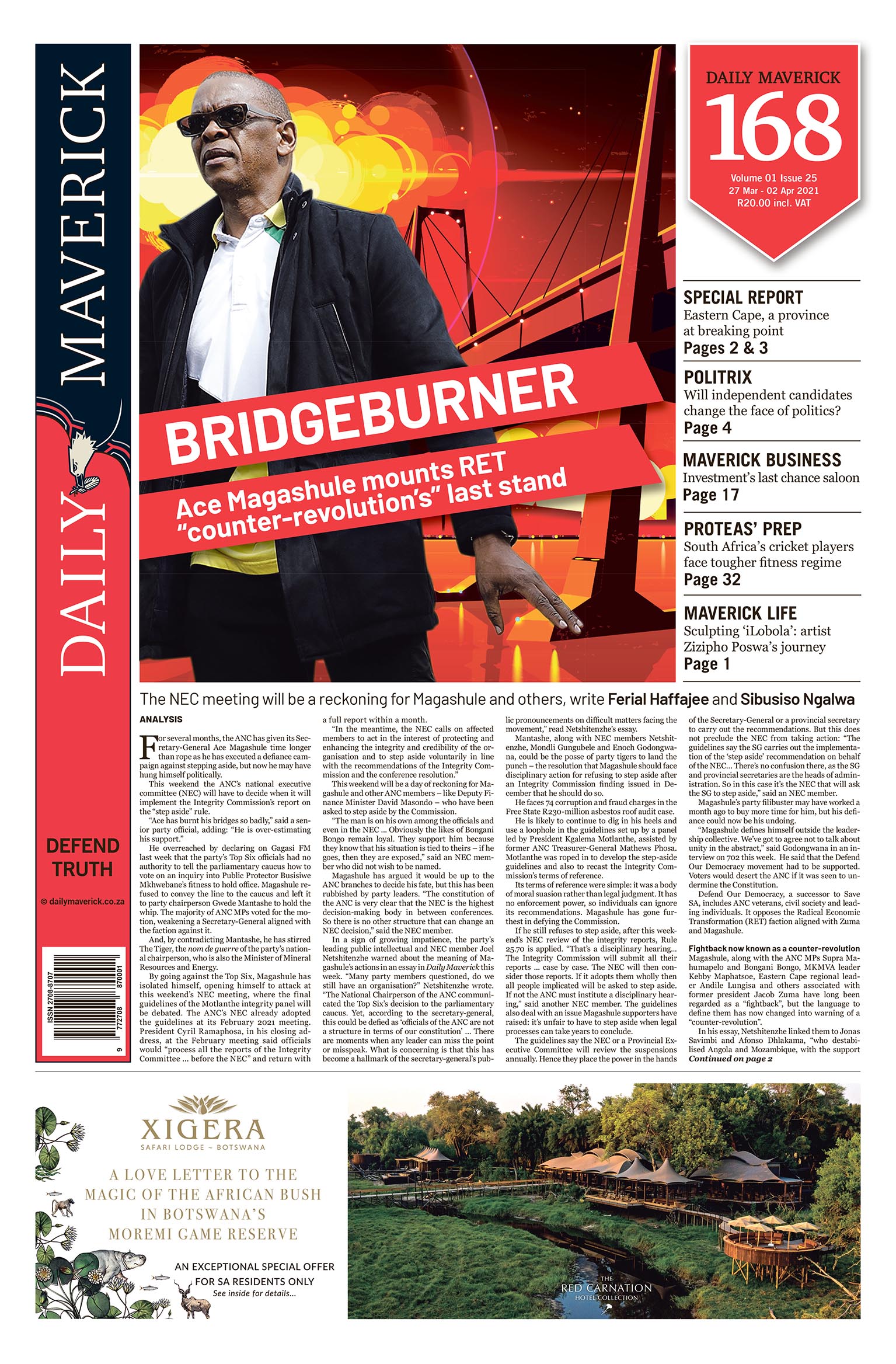DM168 Analysis
Death and dying in the Eastern Cape Continued

We were the people who compiled a 2013 report into healthcare in the Eastern Cape. We hoped that the stories would play a small role in bringing about a better health system for the people of the Eastern Cape. Eight years later, nothing has changed. If anything, it is even worse.
First published in the Daily Maverick 168 weekly newspaper.
Lindeka Gxala, 33, lost her baby when she was seven months pregnant. She ended up at Nelson Mandela Academic Hospital in Mthatha after the nurses at her local clinic were too busy to attend to her. At the hospital in Mthatha she learnt that her unborn baby was dead.
There weren’t enough beds. Gxala had to share a bed with another woman, who was in labour. “The nurses told her to be still, but when the pain came she would thrash and the blood would spill on to the floor,” said Gxala.
Several hours later, the nurses provided Gxala with two tablets. It was never explained to her that these tablets would cause her to abort: “I am not sure what the tablets were or what they were for.” Six hours after taking the drugs Gxala was still waiting for something to happen. “The nurses gave me two more tablets. I became very thirsty and stood up to search for water. I went to the sink and it was full of vomit. I could not drink from it…”
A friend borrowed two blankets for Gxala. “It was cold … and I was glad for the blankets.” Gxala recalls there being no electricity until early in the morning. “When it became dark, the nurses attended to the women and delivered babies by the light of their cellphones.”
Around midnight, 12 hours after taking the first tablets, Gxala experienced severe pain and cramps. “I felt something come out of me. I stood up and searched in the darkness for a nurse. The nurses ordered me to walk around. I tried to tell them that something was coming out of me… By then my dead child had come out feet first and the head was stuck inside me. The baby hung from me as I … tried to plead with the nurses, to beg them for relief from the pain. I was still walking around when I collapsed from the pain. The nurses then removed another patient from her bed and put me in the bed. I stayed there until six in the morning without anyone helping me…”
The nurses eventually took Gxala to the theatre. “The nurses looked at my hospital card and commented that they had failed to give me an injectable anaesthetic for pain… Without giving me painkillers they then removed the dead baby while I was conscious. The pain was terrible. They eventually gave me something for the pain, but I had felt everything. I cried the whole time.”
Gxala was sent home the same day.
Gxala’s horror took place on 11 June 2013 and her story was published in Death and Dying in the Eastern Cape, a report released by the Treatment Action Campaign and SECTION27 towards the end of 2013. There were many other horror stories in that report. Like the story of Baby Ikho, who died after the Holy Cross Hospital ran out of oxygen; the story of a nurse who had given up on calling for an ambulance because they never came…
Dr Aaron Motsoaledi was the health minister at the time. He was horrified by the report and wept in a conversation about its contents. But his first appeal to us was to try to get it squashed, begging that some stories be redacted. Because he made big promises of improving things, we agreed. For a few months there was a flurry of activity. Maybe he tried, but not hard enough. Soon the Eastern Cape health system was forgotten again.
We were the people who compiled the 2013 report. We hoped that the stories would play a small role in bringing about a better health system for the people of the Eastern Cape.
We wrote at the time that the healthcare workers and patients who had bravely reported their stories had opened a window that allows us to see not only their suffering but also part of a bigger picture of pain and indignity.
Eight years later, nothing has changed. If anything, it is even worse.
There are no excuses for what was described in the report, just as there are no excuses for what has been described in the series of stories published by Estelle Ellis and the Maverick Citizen team this past week.
The crisis of the Eastern Cape health system is not an apartheid legacy but a man-made failure of politicians who do not take their duties seriously and are often corrupt.
It is a crisis of management and democratic political oversight by Parliament. It is a failure too of bodies like the South African Human Rights Commission, which was alerted to the crisis and held public hearings back in 2015. It is a repudiation of the constitutional promise to all the people who live in the Eastern Cape.
The purpose of the Constitution is to give South Africans a means to have the government ordered to take measures to realise the rights for which they struggled.
The fundamental right that bleeds from the heart of these stories is found in Section 27 of the Constitution. It is the right of “everyone to have access to healthcare services” and the duty on the government to “take reasonable legislative and other measures” so as to progressively realise this right.
Instead, for years there has been a deterioration of health services in the Eastern Cape. This has to stop and the people must have a remedy. Crocodile tears are no longer an option. DM168
Mark Heywood is the editor of Maverick Citizen and Anso Thom is the managing editor of Maverick Citizen.
This story first appeared in our weekly Daily Maverick 168 newspaper which is available for free to Pick n Pay Smart Shoppers at these Pick n Pay stores.
"Information pertaining to Covid-19, vaccines, how to control the spread of the virus and potential treatments is ever-changing. Under the South African Disaster Management Act Regulation 11(5)(c) it is prohibited to publish information through any medium with the intention to deceive people on government measures to address COVID-19. We are therefore disabling the comment section on this article in order to protect both the commenting member and ourselves from potential liability. Should you have additional information that you think we should know, please email [email protected]"






 Become an Insider
Become an Insider